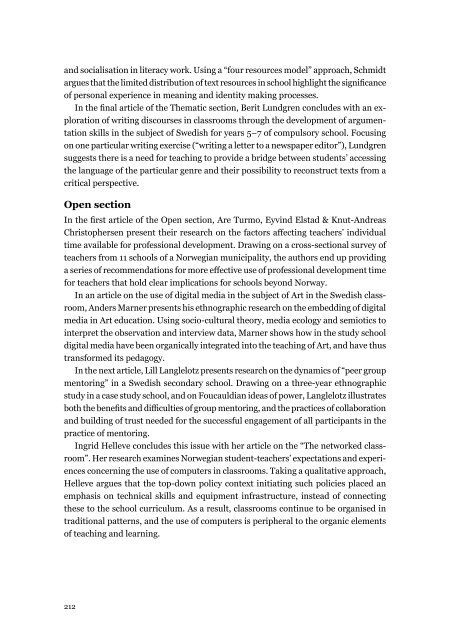Download issue - Umeå universitet
Download issue - Umeå universitet
Download issue - Umeå universitet
Create successful ePaper yourself
Turn your PDF publications into a flip-book with our unique Google optimized e-Paper software.
and socialisation in literacy work. Using a “four resources model” approach, Schmidt<br />
argues that the limited distribution of text resources in school highlight the significance<br />
of personal experience in meaning and identity making processes.<br />
In the final article of the Thematic section, Berit Lundgren concludes with an exploration<br />
of writing discourses in classrooms through the development of argumentation<br />
skills in the subject of Swedish for years 5–7 of compulsory school. Focusing<br />
on one particular writing exercise (“writing a letter to a newspaper editor”), Lundgren<br />
suggests there is a need for teaching to provide a bridge between students’ accessing<br />
the language of the particular genre and their possibility to reconstruct texts from a<br />
critical perspective.<br />
Open section<br />
In the first article of the Open section, Are Turmo, Eyvind Elstad & Knut-Andreas<br />
Christophersen present their research on the factors affecting teachers’ individual<br />
time available for professional development. Drawing on a cross-sectional survey of<br />
teachers from 11 schools of a Norwegian municipality, the authors end up providing<br />
a series of recommendations for more effective use of professional development time<br />
for teachers that hold clear implications for schools beyond Norway.<br />
In an article on the use of digital media in the subject of Art in the Swedish classroom,<br />
Anders Marner presents his ethnographic research on the embedding of digital<br />
media in Art education. Using socio-cultural theory, media ecology and semiotics to<br />
interpret the observation and interview data, Marner shows how in the study school<br />
digital media have been organically integrated into the teaching of Art, and have thus<br />
transformed its pedagogy.<br />
In the next article, Lill Langlelotz presents research on the dynamics of “peer group<br />
mentoring” in a Swedish secondary school. Drawing on a three-year ethnographic<br />
study in a case study school, and on Foucauldian ideas of power, Langlelotz illustrates<br />
both the benefits and difficulties of group mentoring, and the practices of collaboration<br />
and building of trust needed for the successful engagement of all participants in the<br />
practice of mentoring.<br />
Ingrid Helleve concludes this <strong>issue</strong> with her article on the “The networked classroom”.<br />
Her research examines Norwegian student-teachers’ expectations and experiences<br />
concerning the use of computers in classrooms. Taking a qualitative approach,<br />
Helleve argues that the top-down policy context initiating such policies placed an<br />
emphasis on technical skills and equipment infrastructure, instead of connecting<br />
these to the school curriculum. As a result, classrooms continue to be organised in<br />
traditional patterns, and the use of computers is peripheral to the organic elements<br />
of teaching and learning.<br />
212

















